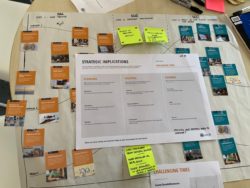Towards a Digital Future: Reflections on the Leeds Digital Summit
Written By: Sherif Youssef.
Driven by the central tenets of the Leeds Inclusive Growth Strategy, Leeds City Council organised the first digital summit last December. Different stakeholders from the private, public and civil society sectors were invited. The event began with an introductory keynote by Tom Riordan (Chief Executive of Leeds City Council) and Eve Roadhouse (Chief Officer, Economic Development of Leeds City Council). The central theme of the keynote was addressing how technology could play a seminal role in solving the key problems facing Leeds City, such as social exclusion and poverty, and ways of promoting the skills required in the future, particularly after the UK leaves the European Union.
The event was a stepping stone on reflecting how Leeds can play an important role as a technological capital of the northern region and ultimately become the heart of the northern powerhouse, particularly after the recent move of BBC’s Channel Four. A second keynote was delivered by Rashik Parmar,  Technical Executive at IBM UK, concerning ‘Be digital or be digitalised’ to provide a critical understanding of how technology can increase productivity within the region. The key argument was how and in what ways technology could be utilised to make data-informed decisions in order to deliver public value in different sectors, ranging from education to healthcare.
Technical Executive at IBM UK, concerning ‘Be digital or be digitalised’ to provide a critical understanding of how technology can increase productivity within the region. The key argument was how and in what ways technology could be utilised to make data-informed decisions in order to deliver public value in different sectors, ranging from education to healthcare.
The second part of the day was utilised for various strategic foresight activities, ideation, prototyping sessions and group discussions concerning future trends that might occur in Leeds City and the strategic (economic, political and cultural) implications associated with them. These trends could be from the rise of blockchain technology, the increase of the sharing economy, precarious work situations, artificial intelligence and the significant risks associated with automation.
 Throughout the discussions, different participants emphasised the need for more collaborative work among the public, private and civil societies and using various anchor institutions (such as the NHS, the BBC and different some universities) effectively to promote community wealth building. This is due to the lack of funding and the on-going austerity imposed by the central government. It is also necessary to invest in digital infrastructure and digital skills to overcome the on-going wave of automation, as well as to recognise the urgent need for progressive policies to build an inclusive economy that addresses different local problems.
Throughout the discussions, different participants emphasised the need for more collaborative work among the public, private and civil societies and using various anchor institutions (such as the NHS, the BBC and different some universities) effectively to promote community wealth building. This is due to the lack of funding and the on-going austerity imposed by the central government. It is also necessary to invest in digital infrastructure and digital skills to overcome the on-going wave of automation, as well as to recognise the urgent need for progressive policies to build an inclusive economy that addresses different local problems.
After nearly a decade after the financial crisis and three years following the Brexit vote, addressing societal inequalities and the increasing poverty within British society has become a matter of urgency. It is important to note that local governments alone cannot address major societal challenges within the region. It is up to the central government, in conjunction with effective strategic collaboration with the private sector, to deliver on its promises to enact the most needed policies to enhance economic growth within different marginalised communities across the UK.
